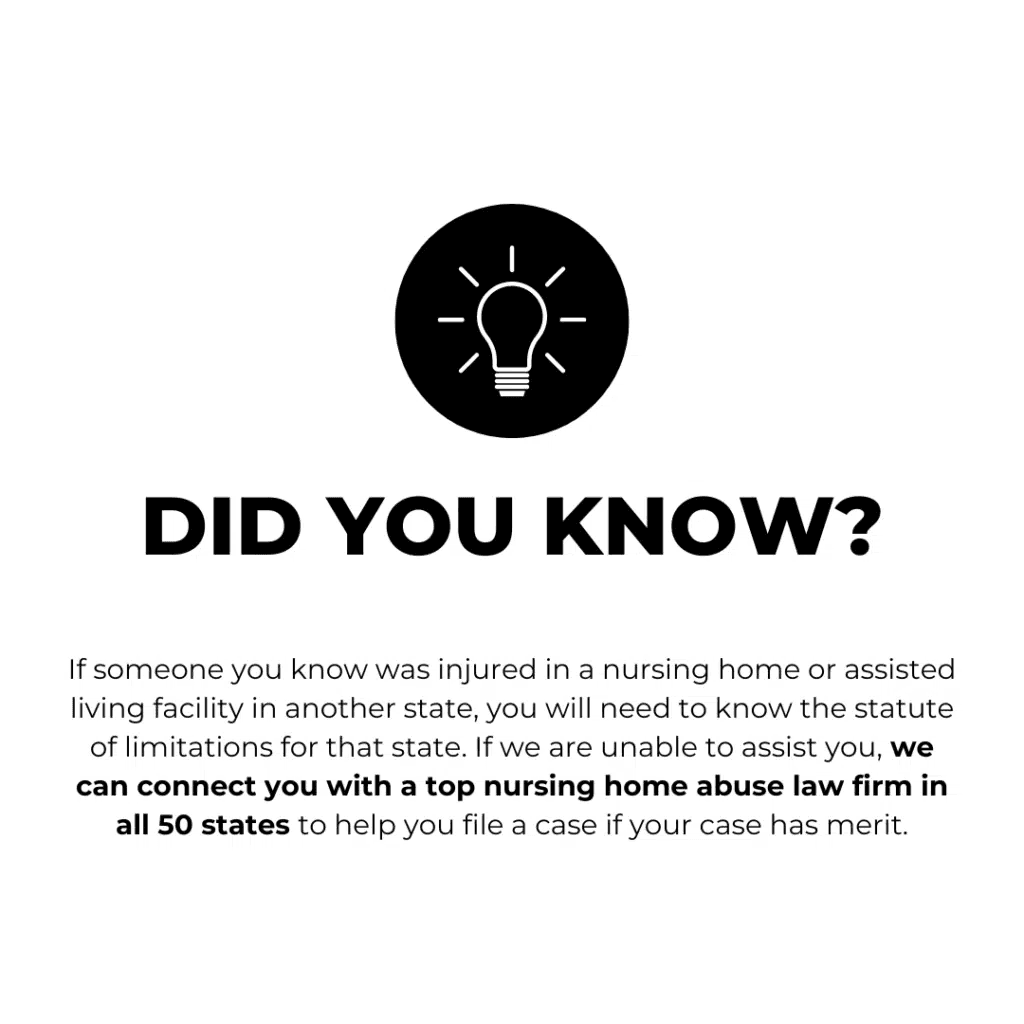
Nursing home abuse and neglect put vulnerable residents at serious risk, leading to malnutrition, dehydration, infections, and preventable injuries. When facilities fail to provide adequate care, residents suffer, and families are left feeling helpless. Lack of supervision, improper medical treatment, and unsafe conditions can result in devastating harm. Understanding the warning signs, knowing your legal rights, and holding negligent facilities accountable are crucial steps in protecting your loved ones. Learn how to take action and seek justice.
November 5, 2024
3 min
One of the most insidious forms of neglect that often goes unnoticed is malnourishment. The elderly population in nursing homes relies on caregivers for daily nutrition, yet malnourishment in these facilities is shockingly common. This problem is exacerbated by the profit-driven motives of many nursing home owners, who cut costs at the expense of residents’ well-being.
Malnourishment not only compromises the physical health of elderly residents but also diminishes their quality of life, leading to a decline in cognitive function, increased risk of infections, and even death. It’s essential to know about the problem of malnourishment in nursing homes, why it is a form of neglect and abuse, and understand the role of profit motives in perpetuating this crisis.
Malnourishment occurs when the body does not receive the nutrients it needs to maintain health and proper functioning. For elderly nursing home residents, malnutrition is particularly dangerous because their bodies are already vulnerable due to age-related factors such as weakened immune systems, chronic illnesses, and limited mobility. Malnourishment can manifest in various ways, including significant weight loss, muscle wasting, dehydration, fatigue, cognitive decline, and increased susceptibility to infections and pressure sores.
In the context of nursing homes, malnourishment is often the result of neglect. Caregivers are responsible for ensuring that residents receive adequate nutrition, but when profit motives take precedence, nursing homes may cut costs in ways that directly contribute to malnutrition. This can include providing low-quality meals, understaffing the facility, or failing to monitor and address residents’ specific dietary needs.
Nursing home neglect occurs when staff members fail to provide residents with the necessary care and attention to meet their basic needs. Malnourishment is a direct consequence of this neglect, as it often results from a failure to provide appropriate meals, assist residents with eating, or account for special dietary requirements.
Some of the ways neglect leads to malnourishment include:
Malnourishment in nursing home residents can have devastating consequences on both physical and mental health. Older adults are already more susceptible to health complications, and when they do not receive adequate nutrition, the effects can be compounded. Here are several reasons why malnourishment is particularly harmful to nursing home residents:
Malnutrition severely weakens the immune system, making residents more vulnerable to infections. Proper nutrition, the body can produce the antibodies and immune cells necessary to fight pathogens. For elderly residents, this means an increased risk of infections such as pneumonia, urinary tract infections, and skin infections like cellulitis. Malnourished residents are also more prone to developing pressure ulcers (bedsores), which can become infected and lead to further complications.
When the body doesn’t receive enough protein and calories, it breaks down muscle tissue for energy. This leads to muscle wasting, which causes physical weakness and reduces mobility. For elderly residents, losing muscle mass increases the risk of falls, fractures, and injuries. A lack of mobility also increases the likelihood of bedsores and blood clots, which can be life-threatening if not properly managed.
Proper nutrition is essential for maintaining cognitive function. In elderly residents, malnourishment can lead to cognitive decline, resulting in confusion, memory loss, and difficulty concentrating. Residents with dementia or Alzheimer’s disease are particularly vulnerable, as malnourishment can accelerate the progression of their cognitive impairment. Malnutrition-induced cognitive decline can make it even harder for residents to communicate their needs, creating a dangerous cycle of neglect.
Malnourished residents are more likely to experience worsening symptoms of chronic conditions such as diabetes, heart disease, and hypertension. Malnutrition weakens the body’s ability to manage these conditions, leading to more frequent hospitalizations and higher mortality rates. For example, residents with diabetes may experience more severe complications, such as diabetic ulcers or kidney damage, if their nutritional needs are not met.
Nutrition is crucial in the body’s ability to heal from injuries and recover from illness. Malnourished residents often experience delayed healing from wounds, infections, and surgical procedures. This prolonged recovery time increases their risk of developing complications, which can further deteriorate their overall health. In some cases, malnourishment can be a contributing factor to premature death.
For-profit nursing homes operate under a business model that prioritizes maximizing revenue and minimizing expenses. Unfortunately, this profit-driven approach often results in cost-cutting measures that compromise the quality of care residents receive, particularly in the area of nutrition. The drive for profit can manifest in several ways that contribute to malnourishment:
Food is one of the largest expenses in a nursing home’s operating budget, and in for-profit facilities, it is often one of the first areas where cuts are made. Instead of providing fresh, nutritious meals, nursing homes may serve cheaper, processed foods that lack the nutrients elderly residents need. Portions may also be reduced, further contributing to malnourishment. This emphasis on cutting food costs directly impacts residents’ health and well-being.
To maximize profits, many nursing homes operate with minimal staff, which can lead to neglect in essential areas of care, including nutrition. When there aren’t enough caregivers to assist residents during mealtimes, many may skip meals, struggle to eat independently or receive inadequate supervision. Staff members may also need more time to track each resident’s nutritional intake, allowing malnourishment to go unchecked.
Another consequence of profit-seeking is the need for proper training for nursing home staff. Untrained or poorly trained caregivers may need to recognize the signs of malnourishment or know how to address residents’ dietary needs. This can fail to provide appropriate care, leaving residents vulnerable to malnutrition.

If you suspect that your loved one is suffering from malnourishment due to neglect or abuse in a nursing home, it is important to take immediate action. Here are the steps you can take to protect your loved one and address the situation:
Family members should be vigilant for signs of malnourishment when visiting their loved ones in nursing homes. Some common signs of malnourishment include:
If you notice any of these symptoms, addressing them immediately is essential.
If you suspect malnourishment, your first step should be to speak with the nursing home staff and management. Ask them about your loved one’s dietary plan, and inquire about how meals are being monitored. Ensure that your loved one receives the proper amount of food and that their specific nutritional needs are met. Document any interactions with the staff, including what was discussed and their responses.
If you believe your loved one is malnourished, it is critical to request a medical evaluation from a doctor or nutritionist. A healthcare professional can assess your loved one’s nutritional status and determine whether they receive adequate nutrition. This evaluation can also provide you with documented evidence of malnourishment, which can be used if further action is needed.
If the nursing home continues to neglect your loved one’s nutritional needs despite your concerns, it may be time to consider relocating them to a different facility. Research alternative nursing homes that have a better reputation for quality care and ensure that they have adequate staff and resources to meet your loved one’s needs.
One of the most important steps you can take if you suspect that your loved one is suffering from malnourishment due to neglect is to contact a nursing home neglect attorney. An experienced attorney can help you investigate the situation, gather evidence, and take legal action against the nursing home. In many cases, filing a lawsuit can hold the facility accountable for its neglect and ensure that your loved one receives the care and compensation they deserve.
Nursing home neglect attorneys specialize in cases involving abuse, neglect, and substandard care in long-term care facilities. They can help you navigate the legal process, which may include filing a complaint, pursuing a lawsuit for damages, and advocating for your loved one’s rights. Attorneys can also work to ensure that other residents in the facility are protected from similar neglect in the future.
Malnourishment in nursing homes is a severe and often overlooked form of neglect and abuse. Driven by profit motives, many for-profit nursing homes cut costs by serving inadequate meals, understaffing their facilities, and failing to monitor residents’ nutritional needs. This neglect can have devastating consequences for elderly residents, leading to cognitive decline, infections, and even death.
Family members play a crucial role in identifying and addressing malnourishment in their loved ones. If you suspect that your loved one is suffering from malnourishment due to neglect, it is essential to take immediate action by speaking with the nursing home staff, requesting a medical evaluation, and consulting with a nursing home neglect attorney.
Michael Hill is a nationally recognized attorney who handles exclusively cases against long term care facilities. Michael and his firm, Michael Hill Trial Law, are headquartered in Cleveland, Ohio but handle cases across the country.
Disclaimer: This information is provided for informational purposes only. Nothing in this article should be construed as providing legal advice or the creation of an attorney client relationship. Laws are updated frequently and change from state to state. If you desire legal advice, you can contact Michael Hill Trial Law at www.protectseniors.com, send an email to info@protectseniors.com, call (800) 659-2712 to begin an investigation, or contact another attorney.